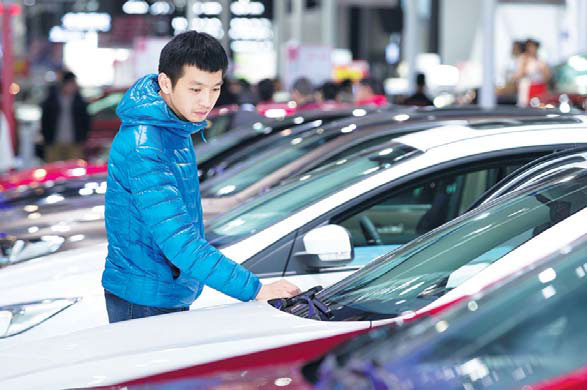Survey: Dealerships may face slowdown
By Li Fusheng (China Daily Europe) Updated: 2017-03-12 13:45|
A man examines cars on display at a dealership in Nanjing, Jiangsu province. Su Yang / For China Daily |
Despite the vastness of China's car market, the percentage of dealers who believe they will be profitable this year has fallen to less than half of last year's figure due to inventory concerns.
A survey of more than 1,400 dealerships shows that only 17 percent think they will be profitable this year, while 77 percent believe they will make ends meet and 6 percent say they will lose money.
Last year, 34.2 percent were profitable, 50.4 percent made ends meet and 15.4 percent were in the red.
The survey, conducted by the China Automobile Dealers Association, covered dealerships that sell cars from seven premium brands, 27 international volume car brands and 36 Chinese brands.
Dealers had a good year in 2016 thanks to a sales surge resulting from China's 50 percent tax discount for cars with engines no larger than 1.6 liters and reasonable inventory levels, said Lang Xuehong, a deputy secretary-general of the dealers association.
The association's statistics show that last year, more than 86 percent of dealerships had "acceptable" inventory levels - meaning less than 1.5 times their monthly sales - nearly four times the percentage in 2015.
This performance also drove dealers' satisfaction with carmakers to a score of 81 points, the highest level the survey has seen since it was first undertaken in 2009.
"Car sales saw about 14 percent growth year-on-year in 2016, and it is generally agreed that the situation will not be as good this year," Lang says.
Most industry insiders, including those from the China Association of Automobile Manufacturers, expect this year's growth rate to fall to around 5 percent.
"What dealers fear most is carmakers seting unrealistic sales goals, which would result in high inventory levels and force them to sell cars at a discount."
In fact, the inventory index, which hit a 14-month high last month at 61.5 percent, continued its climb to 66.6 percent in February, according to the dealer association, while a reasonable level should be no higher than 50 percent.
Besides inventories, dealers expect carmakers to produce cars based on demand, to take current dealerships into consideration when they expand their sales network and to prevent dealers from selling cars in regions where they are not authorized, according to the survey.
The dealer association said in the survey that carmakers should listen more to dealers when working out business policies so that they create a win-win situation, but added that relations between the two have improved a lot, "moving toward those between partners or brothers".
Zhang Zhiyong, an independent analyst in Beijing, said dealerships used to be totally subordinate to carmakers, and that their quarrels and compromises in the past one or two years should be remembered as landmarks of their evolving relations.
Carmakers, especially premium brands, are focusing more on dealers in their new business strategies.
Li Hongpeng, senior executive vice-president of Beijing Mercedes-Benz Sales Service, said the company proposed in 2014 that the relations with dealers should be like that of fish and water, and has shifted its philosophy from managing dealers to serving them.
"We track their profitability to learn whether they match our development level. We adjust our business policies and retail support measures based on that."
Porsche said it values its dealers. as they represent the brand with customers.
David Xiao, vice-president of sales at Porsche China, said it is flexible about store sizes in smaller cities, a move he believes will ease the financial burden on investors.
"Last year was a bumper year for us, and we hope that all of us can see better development this year," Xiao says.
lifusheng@chinadaily.com.cn
- 'Cooperation is complementary'
- Worldwide manhunt nets 50th fugitive
- China-Japan meet seeks cooperation
- Agency ensuring natural gas supply
- Global manhunt sees China catch its 50th fugitive
- Call for 'Red Boat Spirit' a noble goal, official says
- China 'open to world' of foreign talent
- Free trade studies agreed on as Li meets with Canadian PM Trudeau
- Emojis on austerity rules from top anti-graft authority go viral
- Xi: All aboard internet express












